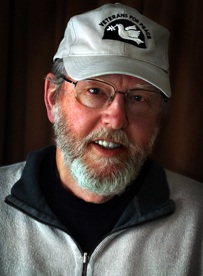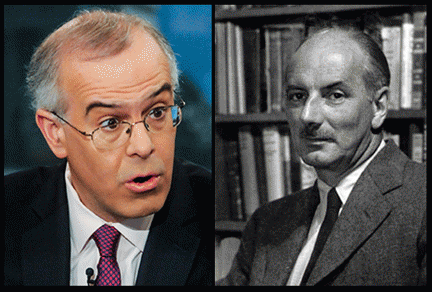I'm a leftist, but I have a weakness for my brothers and sisters on the right. For some reason, I'm compelled to see what troglodytes like Bill O'Reilly, Sean Hannity and Megyn Kelly are thinking. They're all quite entertaining as they do their best to un-man Barack Obama and advocate day-in, day-out for a war with Islam. They are masters of malicious fog.
Then there's a writer like New York Times columnist David Brooks, a man who must sit around observing current events until he figures out a safe, center-right position he can express in the most reasonable, muddled language possible. Reading David Brooks is like trying to get a grip on jello.
In this current political swamp there's also writers like Cenk Uygur, a Turkish naturalized US citizen who left the Muslim religion behind to become an on-line journalist. He did a stint with MSNBC and now is the main man on The Young Turks show. Once a Republican, he's moved left to the progressive side. His recent effort at clarity concerning the question whether "Islam is the motherlode of bad ideas" was brilliant. The topic was a TV exchange among Bill Maher, Sam Harris and Ben Affleck. Harris made the "motherlode" remark. Maher compared Islam to the Mafia. A pissed-off Affleck said they were both talking bigotry.
Brooks' October 3rd column was called "The Problem With Pragmatism." Annoyed at "people who try to govern without philosophic or literary depth," Brooks linked Liberalism with Pragmatism and, with some help from Lewis Mumford and an essay in the 1950s New Republicmagazine, trashed pragmatism as not up to speed for our moment in history, a moment suddenly taken over by more military adventure in the Islam-saturated deserts of Iraq and Syria. Citing Mumford, Brooks writes of our national mission and how "only people with an aroused moral sense will be properly mobilized to stand up for humanity."
Lewis Mumford seems an odd inspiration for Brooks' soft, center-right paean to our current moral mission. Mumford wrote a lot about cities and architecture. He felt human communication, more than the use of tools, was the secret of human advancement. One imagines he would be appalled how secrecy now impedes so much human communication. Mumford was critical of advertising and marketing and of the growing use of credit -- all now on steroids in the holy pursuit of corporate profit. He didn't like things like built-in obsolescence and product changes based on superficial fashion; again, fundamentals of our dysfunctional national condition. Mumford advocated well-made products that would last and be re-used by succeeding generations. He advocated biodiversity. He is said to have influenced people like Jacques Ellul, Witold Rybczynski, E. F. Schumacher, Herbert Marcuse, Thomas Merton, and Marshall McLuhan. How such a writer could be critical of pragmatism I can't fathom.
The popular American purveyor of Pragmatism was, of course, William James, who is considered by many educated Americans as our most American philosopher. The fact a reader can understand and follow James' prose does not mean he is "without philosophic or literary depth."
Jack Nicholson's Marine Colonel Jessup became a cultural icon for declaring on the stand that liberals "can't handle the truth." Brooks seems to be saying something akin to this about pragmatists. He quotes Mumford: "Life is not worth fighting for: bare life is worthless. Justice is worth fighting for, order is worth fighting for, culture ... is worth fighting for; these universal principles and values give purpose and direction to human life."
So why is Brooks condemning pragmatism? I had to wonder if he had, like me, watched and absorbed all 14-hours of the Ken Burns PBS Roosevelt documentary. I was most moved by the liberalism and pragmatism of Franklin and Eleanor Roosevelt as the country struggled against depression. I suspect Brooks was more moved for today's challenges by the bully passions of Teddy Roosevelt, the nation's prototype global imperialist -- also known for his limited domestic progressivism. Brooks closes his column on a classic bullmoose note by declaring, "lofty political idealism is out of favor." He calls for "leaders who understand evil down to its depths, who have literary sensibilities and who react with a heart brimming with moral emotion."
Here, it needs to be noted that Teddy Roosevelt and William James were contemporaries very much at odds on issues of war and peace, especially in 1910 after Roosevelt reluctantly turned the White House over to Taft. Roosevelt was publishing essays in 1910 advocating the United States' duty to intervene militarily to manage nations that he deemed could not manage themselves. War was the ultimate arena for manliness.
The pragmatist James spoke out against this view. In a famous 1910 essay, "The Moral Equivalent of War," he refers to "Roosevelt's weaklings and mollycoddles," epithets no doubt aimed at him. The point of the essay is not the elimination of the military, but to put it in its place and to re-channel militarist energy to neglected domestic issues. "The only thing needed henceforward is to inflame the civic temper as past history has inflamed the military temper." He saw imperial military adventurism as a vain and destructive waste of resources when there were so many important civic demands that needed addressing.
"Reflective apologists for war at the present day all take it religiously. It is a sort of sacrament. . . . human nature at its highest dynamic. Its 'horrors' are a cheap price to pay for rescue from the only alternative supposed, of a world of clerks and teachers, of co-education and zoophily, of 'consumer leagues' and 'associated charities,' of industrialism unlimited and feminism unabashed."
Typically humble, in the essay "What Pragmatism Means," James credits Charles Pierce for creating Pragmatism in 1878 in an essay called "How to Make Our Ideas Clear." He elaborated on Pierce's notion of clarity. "The pragmatic method is primarily a method of settling metaphysical disputes that otherwise might be interminable." The focus of this enterprise, he writes, "is to try to interpret each notion by tracing its respective practical consequences."
The point is to be clear and avoid abstruse and elite academic language that, too often, obscures meaning and befogs rather than enlightens. One of the more egregious examples of such elite befoggery, of course, was Leo Strauss, the intellectual father of the neo-con movement. His philosophical writing was notorious for being written on two levels -- one literal and one between the lines intended for initiates. Since he was advocating things like domination by an elite, the philosophical language of befoggery served his purpose well with students like Allan Bloom, Irving Kristol, Paul Wolfowitz and Richard Perle, many of the people who brought us the Bush/Cheney Iraq War.
Consider Andrew Bacevich, professor of International Relations and History at Boston University. He's a retired Army full colonel who lost a son to combat in Iraq. He's also been linked with the pragmatic school of writing. In 2012, he edited a book of essays called The Short American Century: A Postmortem. He describes the book as "a dissenters' guide to the American Century," the latter a term he points out was coined by publisher Henry Luce in the 1950s. He says Americans need to be "discomfit(ed)" from their nostalgic attachment to this past.
(Note: You can view every article as one long page if you sign up as an Advocate Member, or higher).





